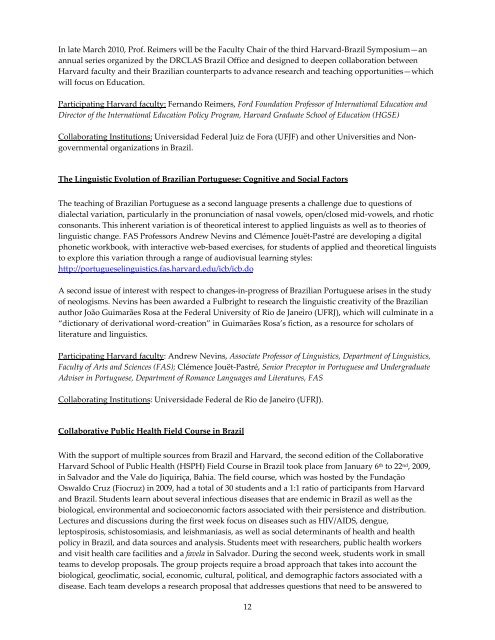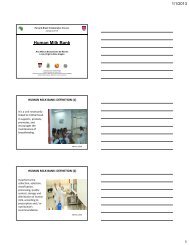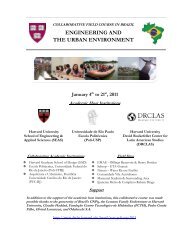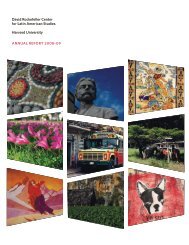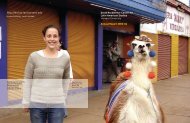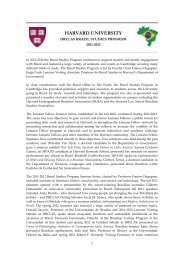Harvard - Brazil Office - DRCLAS - David Rockefeller Center for ...
Harvard - Brazil Office - DRCLAS - David Rockefeller Center for ...
Harvard - Brazil Office - DRCLAS - David Rockefeller Center for ...
Create successful ePaper yourself
Turn your PDF publications into a flip-book with our unique Google optimized e-Paper software.
In late March 2010, Prof. Reimers will be the Faculty Chair of the third <strong>Harvard</strong>‐<strong>Brazil</strong> Symposium—an<br />
annual series organized by the <strong>DRCLAS</strong> <strong>Brazil</strong> <strong>Office</strong> and designed to deepen collaboration between<br />
<strong>Harvard</strong> faculty and their <strong>Brazil</strong>ian counterparts to advance research and teaching opportunities—which<br />
will focus on Education.<br />
Participating <strong>Harvard</strong> faculty: Fernando Reimers, Ford Foundation Professor of International Education and<br />
Director of the International Education Policy Program, <strong>Harvard</strong> Graduate School of Education (HGSE)<br />
Collaborating Institutions: Universidad Federal Juiz de Fora (UFJF) and other Universities and Non‐<br />
governmental organizations in <strong>Brazil</strong>.<br />
The Linguistic Evolution of <strong>Brazil</strong>ian Portuguese: Cognitive and Social Factors<br />
The teaching of <strong>Brazil</strong>ian Portuguese as a second language presents a challenge due to questions of<br />
dialectal variation, particularly in the pronunciation of nasal vowels, open/closed mid‐vowels, and rhotic<br />
consonants. This inherent variation is of theoretical interest to applied linguists as well as to theories of<br />
linguistic change. FAS Professors Andrew Nevins and Clémence Jouët‐Pastré are developing a digital<br />
phonetic workbook, with interactive web‐based exercises, <strong>for</strong> students of applied and theoretical linguists<br />
to explore this variation through a range of audiovisual learning styles:<br />
http://portugueselinguistics.fas.harvard.edu/icb/icb.do<br />
A second issue of interest with respect to changes‐in‐progress of <strong>Brazil</strong>ian Portuguese arises in the study<br />
of neologisms. Nevins has been awarded a Fulbright to research the linguistic creativity of the <strong>Brazil</strong>ian<br />
author João Guimarães Rosa at the Federal University of Rio de Janeiro (UFRJ), which will culminate in a<br />
“dictionary of derivational word‐creation” in Guimarães Rosa’s fiction, as a resource <strong>for</strong> scholars of<br />
literature and linguistics.<br />
Participating <strong>Harvard</strong> faculty: Andrew Nevins, Associate Professor of Linguistics, Department of Linguistics,<br />
Faculty of Arts and Sciences (FAS); Clémence Jouët‐Pastré, Senior Preceptor in Portuguese and Undergraduate<br />
Adviser in Portuguese, Department of Romance Languages and Literatures, FAS<br />
Collaborating Institutions: Universidade Federal de Rio de Janeiro (UFRJ).<br />
Collaborative Public Health Field Course in <strong>Brazil</strong><br />
With the support of multiple sources from <strong>Brazil</strong> and <strong>Harvard</strong>, the second edition of the Collaborative<br />
<strong>Harvard</strong> School of Public Health (HSPH) Field Course in <strong>Brazil</strong> took place from January 6 th to 22 nd , 2009,<br />
in Salvador and the Vale do Jiquiriça, Bahia. The field course, which was hosted by the Fundação<br />
Oswaldo Cruz (Fiocruz) in 2009, had a total of 30 students and a 1:1 ratio of participants from <strong>Harvard</strong><br />
and <strong>Brazil</strong>. Students learn about several infectious diseases that are endemic in <strong>Brazil</strong> as well as the<br />
biological, environmental and socioeconomic factors associated with their persistence and distribution.<br />
Lectures and discussions during the first week focus on diseases such as HIV/AIDS, dengue,<br />
leptospirosis, schistosomiasis, and leishmaniasis, as well as social determinants of health and health<br />
policy in <strong>Brazil</strong>, and data sources and analysis. Students meet with researchers, public health workers<br />
and visit health care facilities and a favela in Salvador. During the second week, students work in small<br />
teams to develop proposals. The group projects require a broad approach that takes into account the<br />
biological, geoclimatic, social, economic, cultural, political, and demographic factors associated with a<br />
disease. Each team develops a research proposal that addresses questions that need to be answered to<br />
12


